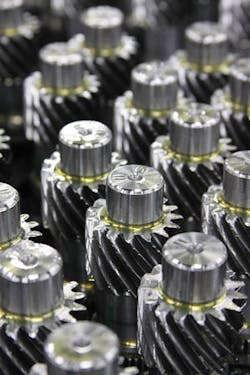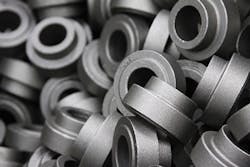Self-Cleaning Filters Protect Wash Water Recycling System
Titanium is an essential material used in a broad range of aerospace applications due to its light weight and high strength.
Global Titanium of Detroit, Mich., purchases titanium chips and turnings from manufacturers around the world and recycles more than a million pounds of them each month for use by producers of titanium, steel, stainless steel, aluminum and powder metallurgy products.
The chips are crushed and then washed with water on a side hill screen, which captures the large pieces but allows particles smaller than 230 microns to pass through into the wastewater stream. The company recycles wash water on site through an ultrafiltration system and then reuses it to comply with environmental regulations.
Challenges
The small titanium particles were damaging the ultra-filter, necessitating the use of a pre-filter. Global Titanium needed to recover the titanium particles as an additional source of recyclable material while handling the 100,000 gallons of water per day used in the washing process. Global Titanium also required a self-cleaning filter using permanent media to minimize downtime and maintenance.
“The titanium chips contain every kind of contaminant imaginable: coolant, dirt, plastic and cardboard,” said Jesse Oliver, plant engineer at Global Titanium. “The primary contaminant is cardboard, which produces long, stringy fibers that are hard to handle.”
Solution
The customer rented an Eaton DCF-800 mechanically cleaned filter to test the feasibility of pre-filtering the wastewater stream.
“The startup went well - although the solids loading was high, requiring a purge every ten minutes,” reported Eaton regional sales manager, Bruce Law. “The customer was encouraged by the filter’s performance and the amount of titanium that was retained.”
Law said the company sampled several different element retentions and eventually decided on the .006-inch (150-micron) slotted element because it most efficiently removed titanium particles while maintaining the required system flow and pressure.
DCF series filters are believed to be among the most efficient mechanically cleaned filters currently available. Operating at consistently low differential pressures, they deliver simple, reliable operations with a low initial investment.
The DCF filter consists of a cylindrical, stainless-steel housing that holds the filter media, in this case a slotted element. Fluid enters inside the element and flows through to the outlet, depositing any contaminants on the inside of the element.
A spring-loaded cleaning disc moves up and down, wiping the filter element clean and depositing the contaminants at the bottom of the housing, out of the flow path. Because the filter remains in service while being cleaned, DCF filters support high process efficiency while minimizing cleaning-related product loss.
Results
Based on the performance of the test system, Global Titanium purchased two DCF self-cleaning filters within 45 days of the completion of the rental. Both units are used to protect the ultra-filter from two different water sources in the plant.
When the customer evaluated the best possible location for the new filters, the flow rates indicated that they needed to purchase DCF-1600 models rather than the DCF-800 that was used in the trial. Both of the DCF-1600 filters use .006-inch media to handle the volume of wash water with an extended purge cycle.
“The Eaton filters are part of a large water treatment project that helped reduce our water consumption by 75 percent,” said Oliver. “The filters are working as expected, and the customer service from Eaton has been outstanding.”
The estimated return on investment is less than six months, based on the amount of particulate retained and water saved.
To learn more about Eaton DCF filters, please visit www.eaton.com.



